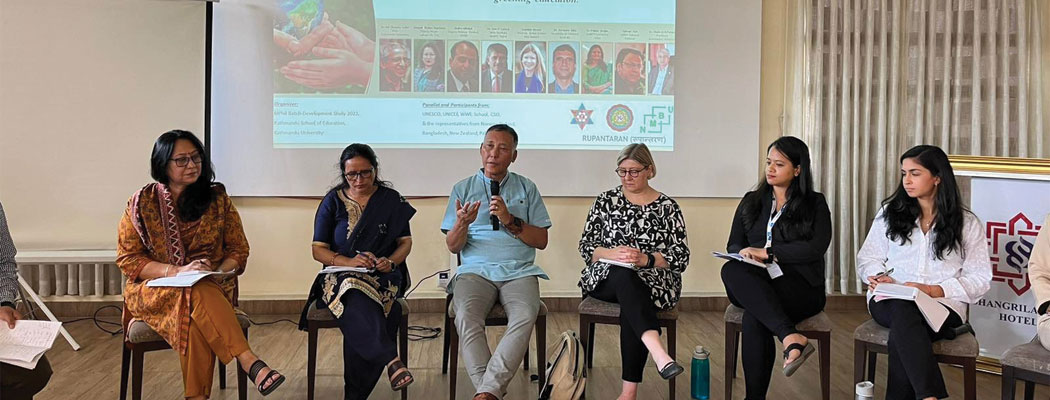
Implementing the 'Green School' Concept for Climate Change Mitigation and Rural Community Development
The recent 'Green School: Education for Sustainable Planet' program organized by Kathmandu University School of Education (KUSOID), Department of Development Education shed light on the urgent need to address climate change and its impact on rural communities. Participants emphasized the significance of implementing the 'green school' concept as a crucial step towards securing a sustainable future for our planet.
Investing in Green Schools for a Sustainable Future: The participants unanimously agreed that investing in green schools should be considered as a last resort to safeguard our future and ensure the sustainability of our planet. By embracing the green school concept, we can create educational institutions that promote environmental consciousness, sustainable practices, and a healthier, greener environment for students.
Local Initiatives for Development and Transformation: Manjali Shakya Bajracharya, the Deputy Mayor of Lalitpur Metropolitan City, emphasized the need for local communities to take the lead in seeking opportunities for development and transformation while keeping the environment at the forefront. She pledged that the metropolis would integrate policies and programs to incorporate the 'green school' concept in future policies, plans, and budgets.
Defining the 'Green School' Concept: During the program, Rudra Adhikari, Deputy Director General of Education and Human Resource Development Center, defined the 'Green School' as an educational institution that fosters a clean, healthy, protective, and green environment. This definition emphasizes the importance of creating an educational setting that prioritizes sustainability and ecological well-being.
Expert Insights on the Importance of Green Schools: Prominent experts including Dr. Lakshmi Paudel of Save the Children, Ghanshyam Gurung of WWF, Prakriti Gurung of UNESCO, Sabina Joshi of UNICEF, Nikita Dhawan of the Norwegian Embassy, Tuovi Leppamen from the Embassy of Finland, and Rozi Ghimire of Action Nepal highlighted the significance of the 'green school' concept. Their collective expertise underlined the positive impact such schools can have on environmental conservation and sustainable development.
International Experiences and Lessons on Education and Climate Change: Participants from Pakistan, Australia, India, and Bangladesh shared their country-specific insights on the interdisciplinary field of education and climate change during the program. This discussion provided valuable learning experiences and lessons that can be applied to the implementation of the 'green school' concept worldwide.
Understanding Green School: Theory and Practice: Riju Dhakal, Sandeep Shrestha, Tina Silpkar, Ravina Maharjan, and Sanjeevani Yonjan presented their research and findings on 'Understanding Green School - Theory and Practice.' Their contributions enriched the program by offering a comprehensive understanding of the practical aspects and theoretical foundations of green schools.
Overall, the 'Green School: Education for Sustainable Planet' program served as a platform for experts, educators, and stakeholders to emphasize the urgent need for implementing the 'green school' concept to combat climate change and promote sustainable development. By prioritizing the integration of environmental consciousness and sustainable practices into our educational institutions, we can secure a greener and brighter future for generations to come.
Published on 7th June 2023
Kathmandu

